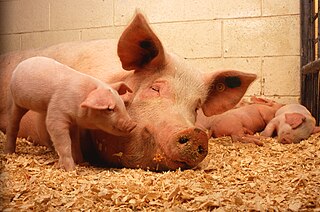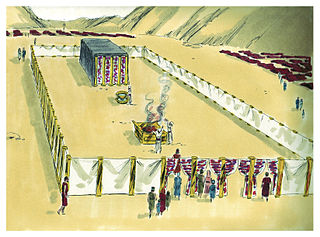Related Research Articles
The Book ofLeviticus is the third book of the Torah and of the Old Testament, also known as the Third Book of Moses. Many hypotheses presented by scholars as to its origins agree that it developed over a long period of time, reaching its present form during the Persian Period, from 538 to 332 BC, although there is much skepticism.
A sin offering is a sacrificial offering described and commanded in the Torah ; it could be fine flour or a proper animal. A sin offering also occurs in 2 Chronicles 29:21 where seven bulls, seven rams, seven lambs and seven he-goats were sacrificed on the command of King Hezekiah for the kingdom, for the sanctuary, and for Judah. Like all types of sacrifices offered on the altar, the flour had to be unscented and the animal had to be completely unblemished. This offered sacrifice accompanied the important required core means of atonement for the committing of an unintentional transgression of a prohibition, that either has brought guilt upon the 'community of Israel' or the individual. This offering is brought during or after atonement for those transgressions that had been committed inadvertently, or in ignorance: intentional transgressions could only be absolved by other forms of atonement, or in severe cases kareth. It was distinct from the biblical guilt offering.
Capital punishment in traditional Jewish law has been defined in Codes of Jewish law dating back to medieval times, based on a system of oral laws contained in the Babylonian and Jerusalem Talmud, the primary source being the Hebrew Bible. In traditional Jewish law there are four types of capital punishment: a) stoning, b) burning by ingesting molten lead, c) strangling, and d) beheading, each being the punishment for specific offenses. Except in special cases where a king can issue the death penalty, capital punishment in Jewish law cannot be decreed upon a person unless there were a minimum of twenty-three judges (Sanhedrin) adjudicating in that person's trial who, by a majority vote, gave the death sentence, and where there had been at least two competent witnesses who testified before the court that they had seen the litigant commit the offense. Even so, capital punishment does not begin in Jewish law until the court adjudicating in this case had issued the death sentence from a specific place on the Temple Mount in the city of Jerusalem.
In Judaism, the korban, also spelled qorban or corban, is any of a variety of sacrificial offerings described and commanded in the Torah. The plural form is korbanot, korbanoth, or korbanos.

In some religions, an unclean animal is an animal whose consumption or handling is taboo. According to these religions, persons who handle such animals may need to ritually purify themselves to get rid of their uncleanliness.

In Judaism, ritual washing, or ablution, takes two main forms. Tevilah (טְבִילָה) is a full body immersion in a mikveh, and netilat yadayim is the washing of the hands with a cup.

Leviticus 18 deals with a number of sexual activities considered abominable, including incest and bestiality. The chapter also condemns Moloch worship. It is part of the Holiness Code, and its sexual prohibitions are largely paralleled by Leviticus 20, except that chapter 20 has more emphasis on punishment.
There are a number of passages in the Hebrew Bible and the New Testament that have been interpreted as involving same-sex sexual activity and relationships. The passages about homosexual individuals and sexual relations in the Hebrew Bible are found primarily in the Torah. The book of Leviticus chapter 20 is more comprehensive on matters of detestable sexual acts. Some texts included in the New Testament also reference homosexual individuals and sexual relations, such as the Gospel of Matthew, the Gospel of Luke, and Pauline epistles originally directed to the early Christian churches in Asia Minor. Both references in the Hebrew Bible and the New Testament have been interpreted as referring primarily to male homosexual individuals and sexual practices.
Sex is considered repeatedly in the Hebrew Bible. Some references provide unambiguous ethical regulations, such as the laws given in Leviticus or Deuteronomy. Others are more ambivalent, most famously the potentially homosexual actions of Ham with his father, Noah. Its depictions of homosexuality, rape, prostitution and incest have spurred considerable academic and theological attention.

Pork is a food taboo among Jews, Muslims, and some Christian denominations. Swine were prohibited in ancient Syria and Phoenicia, and the pig and its flesh represented a taboo observed, Strabo noted, at Comana in Pontus. A lost poem of Hermesianax, reported centuries later by the traveller Pausanias, reported an etiological myth of Attis destroyed by a supernatural boar to account for the fact that "in consequence of these events the Galatians who inhabit Pessinous do not touch pork". In Abrahamic religions, eating pig flesh is clearly forbidden by Jewish (kashrut), Islamic (halal) and Adventist dietary laws.
Abomination is an English term used to translate the Biblical Hebrew terms shiqqutsשיקוץ and sheqetsשקץ, which are derived from shâqats, or the terms תֹּועֵבָה, tōʻēḇā or to'e'va (noun) or 'ta'ev (verb). An abomination in English is that which is exceptionally loathsome, hateful, sinful, wicked, or vile.

Parashat Vayikra, VaYikra, Va-yikra, Wayyiqra, or Wayyiqro is the 24th weekly Torah portion in the annual Jewish cycle of Torah reading and the first in the Book of Leviticus. The parashah lays out the laws of sacrifices. It constitutes Leviticus 1:1–5:26.

Tazria, Thazria, Thazri'a, Sazria, or Ki Tazria' is the 27th weekly Torah portion in the annual Jewish cycle of Torah reading and the fourth in the Book of Leviticus. The parashah deals with ritual impurity. It constitutes Leviticus 12:1–13:59. The parashah is made up of 3,667 Hebrew letters, 1,010 Hebrew words, 67 verses, and 128 lines in a Torah Scroll.

Acharei Mot is the 29th weekly Torah portion in the annual Jewish cycle of Torah reading. It is the sixth weekly portion in the Book of Leviticus, containing Leviticus 16:1–18:30. It is named after the fifth and sixth Hebrew words of the parashah, its first distinctive words.
In Judaism, a chillul hashem is an act that violates the prohibition in the Torah of desecrating (chillul) the name (hashem) of God. A chillul hashem occurs when a Jew acts immorally in the presence of others, either Jews or Gentiles. Since Judaism believes that Jews are representatives of God and his moral code, when a Jew acts in a shameful manner, they have represented God poorly, thus desecrating his name. Chillul Hashem is the opposite of a Kiddush Hashem, the act of bringing honor, respect, and glory to God's name. Kiddush Hashem is often used to mean religious martyrdom. The concept of chillul hashem is prevalent in the Tanakh and is often referenced by modern Jews as a reason to uphold the highest moral standard.
Although rare, there are instances within Jewish law that mandate a Jew to sacrifice their own life rather than violate a religious prohibition. One of these prohibitions is that no life should be taken, including one's own. Many more ritual prohibitions exist as well, which means that under limited circumstances a Jew has to self-sacrifice when the greater good calls for breaking a more minor dictate. This practice reflects the practical and perhaps malleable nature of Judaic law.
In Jewish law, ṭumah and ṭaharah are the state of being ritually "impure" and "pure", respectively. The Hebrew noun ṭum'ah, meaning "impurity", describes a state of ritual impurity. A person or object which contracts ṭumah is said to be ṭamé, and thereby unsuited for certain holy activities and uses until undergoing predefined purification actions that usually include the elapse of a specified time-period.

A burnt offering in Judaism is a form of sacrifice first described in the Hebrew Bible. As a tribute to God, a burnt offering was entirely burnt on the altar. This is in contrast to other forms of sacrifice, which was partly burnt and most of it eaten in communion at a sacrificial meal.
The Hebrew term kareth, or extirpation, is a form of punishment for sin, mentioned in the Hebrew Bible and later Jewish writings. Kareth in its simplistic meaning refers to an individual being expelled from the Nation of Israel. In the Talmud, kareth means not necessarily physical "cutting off" of life, but can also mean the extinction of the soul and denial of a share in the world to come.
Judaism regards the violation of any of the 613 commandments as a sin. Judaism teaches that to sin is a part of life, since there is no perfect human and everyone has an inclination to do evil "from youth", though people are born sinless. Sin has many classifications and degrees. During the time of the Temple, Jewish courts punished certain sins with varying forms of punishment depending on the exact sin, as depicted in the Torah. These punishments vary from one of four forms of execution, to lashes, to fines, and everything in between. After the destruction of the second Temple and the Sanhedrin, physical punishments were no longer given due to the necessity of the Sanhedrin for their execution.
References
- 1 2 3 4 5 6 7 8 9 10 "Abomination". The Jewish Encyclopedia .
- ↑ "Abomination". Jewish Virtual Library.
- ↑ [Leviticus 18:22, Leviticus 20:13Hebrew-English Bible Leviticus 18:22, Leviticus 20:13]
- ↑ "Noachian Laws". Jewish Encyclopedia.
- ↑ Aron Pinker. "Abomination to the Egyptians in Genesis 43:32, 46:34 and Exodus 8:22". Scileo.
- ↑ "Judaism and capital punishment". BBC.
- ↑ Bayfield, Tony (2019). Being Jewish Today. Bloomsbury. p. 180. ISBN 9781472962065.
- ↑ "Law of Piggul". Etzion. Archived from the original on 17 June 2019.
- ↑ Brody, Shlomo (28 August 2008). "Ask the Rabbi: Making a sacrifice". The Jerusalem Post . Retrieved 28 September 2022.
- ↑ Moon, Dawne (2014). "Beyond the dichotomy: six religious views of homosexuality". Journal of Homosexuality. 61 (9): 1215–41. doi:10.1080/00918369.2014.926762. PMID 24871867. S2CID 12265338.
- ↑ Winston, Kimberly (September 26, 2011). "Judaism without God? Yes, say American atheists". USA Today. Retrieved December 22, 2018.
- ↑ Jonathan Sacks (2015). "When is it Permitted to Tell a Lie?". Orthodox Union. Archived from the original on 5 October 2015. Retrieved 28 September 2022.
- ↑ "A Portrait of Jewish Americans: Chapter 4: Religious Beliefs and Practices". Pew Forum. 1 October 2013. Retrieved 8 January 2015.